Zoom
Trash

William Blake's Birthday. William Blake was born in London on November 28 1757.
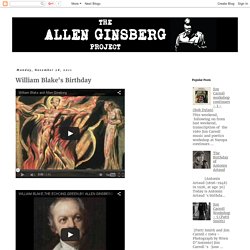
For all things Blake, we refer you to the phenomenal William Blake Archives, an extraordinary resource, overseen by the University of North Carolina's Joseph Viscomi, the University of Rochester's Morris Eaves, and the University of California's Robert Essick. A complete hypertext version of "The Complete Poetry and Prose of William Blake, edited by David V Erdman" is available there. Even more impressive, perhaps, the high-resolution scans, electronic versions, of numerous editions of Blake's illuminated books (not to mention drawings, paintings, engravings, and more), faithfully reproducing his extraordinary, integral, visionary art work, indeed bringing it through into a new technological era.Allen, of course, had his seminal, break-through Blakean vision (recounted, for example, here -
Potrà questa bellezza rovesciare il mondo? Ferlinghetti on Ginsberg & Blake et al. A Poet Unlike Any Other by Hermione Lee. All the Poems by Stevie Smith, edited and with an introduction by Will May New Directions, 806 pp., $39.95 More than with most poets, when people write and talk about Stevie Smith (1902–1971), they try to nail her down with comparisons.
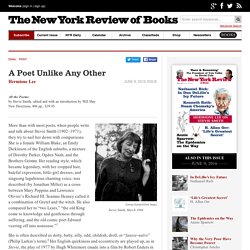
Vita Sackville-West's erotic verse to her lover emerges from 'intoxicating night' When Vita Sackville-West married the diplomat Sir Harold Nicolson in the chapel of the palatial family home at Knole in Kent in 1913, the society column-writers enthused over the 21-year-old bride's beauty and her magnificent wedding gown.

But as a poem going on display this week for the first time makes clear, there was more to the marriage than a conventional fairytale romance. Sackville-West's erotic verse, written in French to her lover Violet Trefusis and translated by Harvey James, the scholar who found it, contrasts daytime strolls through floral meadows with "intoxicating night" when "I search on your lip for a madder caress/ I tear secrets from your yielding flesh. " DN! Guests Juan Felipe Herrera first Latino to be named U.S. poet laureate.
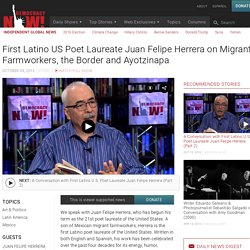
Two Poems 27 Years after Tiananmen. About Freedom Finishing the booze in the dead of night Then smashing the glass This is not freedom Opening the window Jumping out, but forgetting which floor of the high-rise you were on This is not freedom.
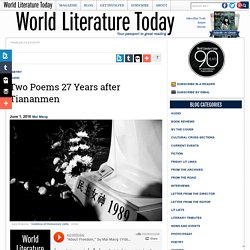
An Illustrated Guide to Ginsberg's Delightful Poem on Walt Whitman. Whenever I think of Whitman — the king of American poetry, the self-publisher, the war-time nurse, and the singer of songs of himself — I think of an English professor I had as a freshman at a Quaker school in North Carolina.

He gave assignments that felt like riddles to my seventeen-year-old mind, things about Buddhists climbing mountains and writing by looking at trees. One day, in his dim office, while he sat in front of a large tattered American flag, he started telling me about the importance of Whitman. He talked about Leaves of Grass, and put so much importance on which version of the book I should read that I thought the actual title was Leaves of Grass Eighteen Fifty-Five.
Two Poems 27 Years after Tiananmen. A Morte (Fernando Pessoa) A Centenary Pessoa - Fernando Pessoa. Guardian Books poetry podcast: Jo Shapcott reads Emily Dickinson. 01 Gioia ItalAm. Carl Sandburg. I 60 haiku più belli di Matsuo Basho - AFORISTICAMENTE. Poeti contemporanei. Interno poesia. «La poesia è poesia quando porta con sè un segreto». G. Ungaretti. Mary Oliver - Books, Biography, Poetry » Books by Mary Oliver. On this page, you’ll find a list of Mary Oliver’s books of poetry and prose.

Poetry books are listed first, with UK editions at the bottom of the list. Books of prose are listed second. Poetry Swan: Poems and Prose Poems (Beacon Press, September 2010) “Joy is not made to be a crumb,” writes Mary Oliver, and certainly joy abounds in her new book of poetry and prose poems. Italian Mother Syndrome: Poet Mary Oliver (and my friend Chuck) on wonder. MYSTERIES, YESby Mary Oliver from Evidence (Beacon Press)Truly, we live with mysteries too marvelous to be understood.How grass can be nourishing in the mouths of the lambs.
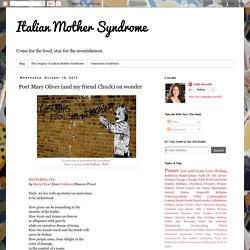
How rivers and stones are forever in allegiance with gravity while we ourselves dream of rising. How two hands touch and the bonds will never be broken. Italian Mother Syndrome: The Origins of Italian Mother Syndrome. Italian Mother Syndrome, more commonly known as IMS.
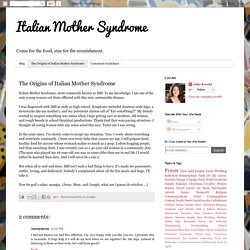
To my knowledge, I am one of the only young women out there afflicted with this rare, untreatable disease. I was diagnosed with IMS as early as high school. Symptoms included doorway-wide hips, a moustache like my mother's, and my persistent clarion call of "Eat something!!! " My friends started to suspect something was amiss when I kept getting cast as mothers, old women, and tough broads in school theatrical productions.
Thank God they were paying attention--I thought all young women with any sense acted this way. Mary Oliver. Mary Oliver - Sedendo quietamente. Who made the world?
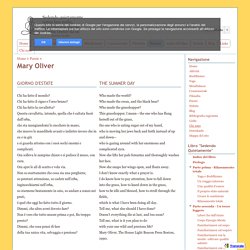
Who made the swan, and the black bear? Who made the grasshopper? This grasshopper, I mean-- the one who has flung herself out of the grass,the one who is eating sugar out of my hand,who is moving her jaws back and forth instead of up and down--who is gazing around with her enormous and complicated eyes.Now she lifts her pale forearms and thoroughly washes her face.Now she snaps her wings open, and floats away.I don't know exactly what a prayer is.I do know how to pay attention, how to fall downinto the grass, how to kneel down in the grass,how to be idle and blessed, how to stroll through the fields,which is what I have been doing all day.Tell me, what else should I have done?
Doesn't everything die at last, and too soon? Tell me, what is it you plan to dowith your one wild and precious life? Mary Oliver: poesie – traduzione di Federica Galetto. ..The Swan Did you too see it, drifting, all night, on the black river? Did you see it in the morning, rising into the silvery air – An armful of white blossoms, A perfect commotion of silk and linen as it leaned into the bondage of its wings; a snowbank, a bank of lilies, Biting the air with its black beak? Did you hear it, fluting and whistling A shrill dark music – like the rain pelting the trees – like a waterfall Knifing down the black ledges?